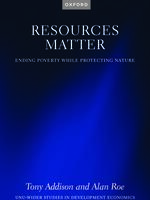Filter by...
Reset all
Publications (8706)
Journal Article
This peer-reviewed research is available free of charge. UNU-WIDER believes that research is a global public good and supports Open Access.
This study presents an empirical framework that explores the relationship between poverty reduction and changes in the production structure of developing countries. We use the new GGDC-UNU-WIDER Economic Transformation Database to measure productivity growth within sectors and structural change –...
Journal Article
The shale gas revolution in the United States induced an unprecedented commodity boom across northwestern India. Leveraging population-based discontinuities in the contemporaneous roll-out of India’s national rural electrification scheme, we show that access to electricity increased total employment...
Journal Article
This peer-reviewed research is available free of charge. UNU-WIDER believes that research is a global public good and supports Open Access.
This study examines the trajectory of global income inequality since 1981. Commonly used (relative) definitions indicate a decline in global inequality since the late 1980s. Looking ahead, it has been intuited that the influence of China's economic development — and that of other rapidly growing...

Dr Miguel Niño-Zarazúa explores the complex effects of clientelism on economic development, state capacity, and governance, emphasising the need for nuanced research to understand these dynamics in the context of rising populism and autocracies.The intricate relationship between clientelistic...

– What does it mean and how much would it cost?
In a new UNU-WIDER paper, which provides background for this year’s OECD Development Cooperation Report, we take a closer look at the end of poverty, what it really means, what it would cost, and how a new approach can improve the tailoring of development cooperation to different contexts.To end...

As a young data developer responsible for mining and analysing the administrative tax data provided to researchers through the SA-TIED programme, I am acutely aware of the economic challenges faced by the average South African, particularly young people. According to recent data from Statistics...

In a new release for the UNU-WIDER and Cambridge University Press Elements in Development Economics series, I look at global capitalist economic history through a new lens. In the book, I highlight how the creation of, command over, and exclusion from knowledge is a critical factor explaining why...
Journal Article
This peer-reviewed research is available free of charge. UNU-WIDER believes that research is a global public good and supports Open Access.
The study analyses trends in global income distribution since 1950 using a new companion WIID dataset with standardized country income percentiles. It investigate the robustness of these trends with respect to key data choices, as well as the degree to which the inequality trend depends on specific...
Working Paper
pdf
This paper makes new estimates of the cost of ending poverty and the global distribution of both the cost and poverty itself. First, the paper discusses definitions of ‘ending’ poverty, arguing that there is an overemphasis (e.g. SDG 1) on the extreme poverty line which is insufficient for multiple...
Working Paper
pdf
Why do some conflict-affected areas remain an arena of violent contestation of the state, while others transition to peace? I suggest that economic networks developed during intrastate conflict—i.e. wartime economies—give rise to continued pockets of insecurity. The significance of the wartime...
Working Paper
pdf
South Africa frequently experiences rolling blackouts (‘load shedding’) due to shortfalls in electricity generation. This is a common problem across the developing world, and yet the developmental impacts of insufficient and unstable electricity supply, and the benefits of mitigating this, are...
Working Paper
pdf
This paper critically examines the shortcomings of post-conflict reconstruction efforts in Afghanistan from 2001 to 2021, arguing that an overemphasis on measurable results and causal inference led to overly narrow, community-driven development interventions that failed to appreciate the complex...
Working Paper
pdf
Domestic resource mobilization has rightly been placed at the centre of the ‘financing for development’ agenda across developing countries. While much is known about the importance of domestic taxes in contributing to this agenda, little is known about the potential importance of domestic savings...
Journal Article
– Evidence from the COVID-19 pandemic in Mozambique
ARTICLE ON EARLY VIEW | Digital labour platforms have grown five-fold over the past decade, enabling significant expansion of gig work worldwide. We interrogate the critique that these platforms tend to amplify aggregate shocks for registered workers. Based on the universe of records from a matching...
Journal Article
This peer-reviewed research is available free of charge. UNU-WIDER believes that research is a global public good and supports Open Access.
– An open repository on inequality and polarization in length of life (1950–2021)
Monitoring health is key for identifying priorities in public health planning and improving healthcare services. Life expectancy has conventionally been regarded as a valuable indicator to compare the health status of different populations. However, this measure is simply the mean of the...

– Journeys in development economics
‘What makes UNU-WIDER a unique place for researchers is the sense of community and the combination of academic rigour, policy relevance, and position within the UN system’ — Amelia Santos-Paulino, UNU-WIDER Alumni ‘UNU-WIDER always manages to bring together many perspectives from development...

In South Africa, the power grid undergoes rotational, scheduled outages—or rolling blackouts—most commonly referred to as load shedding. Load shedding is primarily a consequence of frequent breakdowns at the national utility. These are due to a combination of poor long-term planning, a lack of...

In 2024, central banks worldwide are confronted with the challenges of juggling inflation control, economic growth, and the preservation of financial stability. A new report from the United Nations Department of Economic and Social Affairs (UN DESA) outlines many of the dangers the economy faces...
Blog
We are off track to end poverty. Despite remarkable progress over the past few decades, the goal of eradicating poverty remains elusive, and SDG1: End poverty in all its forms everywhere is out of reach. While more than a billion people have been lifted out of poverty, the pace has significantly...
Journal Article
– Examining the role of conventional banks in deepening access to formal credit
Using a unique district-level panel dataset, we investigate the effect of banking system penetration on financial inclusion in Ghana. To purge potential endogeneity bias in the underlying relationship, we exploit a change in the policy environment of the Ghanaian banking system to instrument for...
Journal Special Issue
This peer-reviewed research is available free of charge. UNU-WIDER believes that research is a global public good and supports Open Access.
Political clientelism — which reflects strategic, discretionary, and targeted exchange of private goods and services for political support to the incumbent — has characterised distributive politics in the Global South for decades. The conditional nature of exchange between political parties and...
Working Paper
pdf
South Africa’s current electricity crises have worsened, placing the country on an uncertain and turbulent economic trajectory.To identify the manufacturing sub-sectors that are most vulnerable to this crises, we use the input–output matrices for the period between 1993 and 2021 to develop a sub...
Working Paper
pdf
African cities are increasingly seen as key to unlocking national structural transformation and inclusive growth, as they tend to host the majority of the non-productive and informal labour force; attract the lion’s share of domestic investment in non-productive sectors; and host different political...
Working Paper
pdf
– What does the long-run evidence tell us?
There is a broad agreement that political and economic institutions matter for long-term development. Yet relatively little is known as to how to adopt good quality institutions and reform weak or poor institutions, for which one needs to know how institutions change. This paper provides a...
Working Paper
pdf
– A combined principal components and clustering analysis
Better understanding of inequality, including its relationship to governance and other key outcomes, is relevant both to academic researchers and to policy-makers. Nevertheless, efforts to establish causal relationships empirically remain hampered by the quality and availability of data, especially...
Working Paper
pdf
– Economic impact under the microscope
Rising levels of income inequality and tight government budgets have spurred discussions in many developing nations about how to appropriately tax high-income earners. In this paper, we study taxpayer responses to an increase in the top marginal tax rate in South Africa, drawing on exceptionally...
Working Paper
pdf
Sub-Saharan Africa (SSA)’s public debt burden remains a challenge to development. Key drivers of public debt include large-scale financing of infrastructure development, adverse impact of multiple shocks including COVID-19 pandemic, maturity mismatches, and high vulnerability to exchange rate and...
Journal Article
ARTICLE IS ON EARLY VIEW | This study investigates the effects of taxation on income inequality in an unbalanced panel of 45 countries in Sub-Saharan Africa over the period 1980–2018. We use two-stage least squares and the instrumental variables quantile regression estimates. We find that taxation...

– Ending Poverty While Protecting Nature
BOOK IN PRODUCTION: SCHEDULED PUBLICATION DECEMBER 2024Almost everything that is essential to modern society — transport and power systems, buildings, machinery, and medical devices — depends upon metals, minerals, and stone as well as oil and natural gas which provide the energy for households and...
Journal Article
This peer-reviewed research is available free of charge. UNU-WIDER believes that research is a global public good and supports Open Access.
– Experimental evidence from Mozambique
THIS ARTICLE IS ON EARLY VIEW | This study examines the impact of digital labor-market platforms on jobs outcomes using a randomized encouragement design embedded in a longitudinal survey of Mozambican technical-vocational college graduates. We differentiate between platforms targeting formal jobs...
Displaying 32 of 8706 results
 Join the network
Join the network